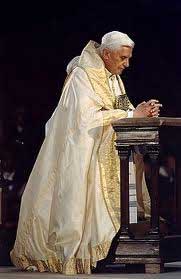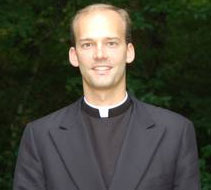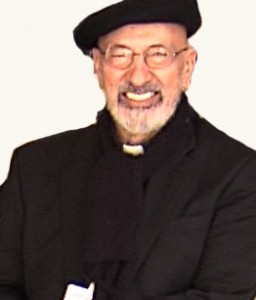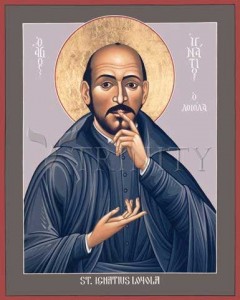Episode 4- The School of Prayer: Reflections on the teachings of Pope Benedict XVI –  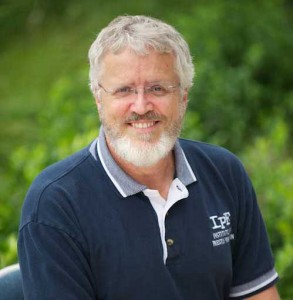 Jacob wrestling with Angel.  The mystery of the name.  We have to let God ask us who we are or will you resist and remain isolated?  Our prayer is only going to be fruitful if we surrender ourselves to the question…who are you?  Like  Jacob, once we give over our name then God can begin to transfigure that name, or in other words, our persons to be more inline with His will, His love, His power.  Eventually, in prayer, we have to enter into the struggle…what is really going on in our souls, in our hearts and are our wrestling with God’s love.   We yield our identity to God’s love.
Jacob wrestling with Angel.  The mystery of the name.  We have to let God ask us who we are or will you resist and remain isolated?  Our prayer is only going to be fruitful if we surrender ourselves to the question…who are you?  Like  Jacob, once we give over our name then God can begin to transfigure that name, or in other words, our persons to be more inline with His will, His love, His power.  Eventually, in prayer, we have to enter into the struggle…what is really going on in our souls, in our hearts and are our wrestling with God’s love.   We yield our identity to God’s love.
The wounding of Jacob by the Angel. Â It is the symbol of the wound, the opening of the self, which symbolizes an entryway to vulnerability…God is deeply affecting us. Â God’s love, concern, and fascination with us is how He enters into our being and “wounds” us. Â If we could “be still” and allow Him to love us, He becomes victorious within us.
The name we yield to God is our heart…the core of our being.  At Baptism, we give over our name, so we give the power over to God over us.  How the “wrestling occurs” and if we stay in it long enough God “wounds” us, into His hands we commend our “spirits”.  How does Jesus transform even this event?
[powerpress]
Deacon James Keating, PhD, the director of Theological Formation for the Institute for Priestly Formation, located at Creighton University, in Omaha.
From  Pope Benedict’s 4 audience on prayer:
Dear brothers and sisters, our entire lives are like this long night of struggle and prayer, spent in desiring and asking for God’s blessing, which cannot be grabbed or won through our own strength but must be received with humility from him as a gratuitous gift that ultimately allows us to recognize the Lord’s face. And when this happens, our entire reality changes; we receive a new name and God’s blessing. And, what is more: Jacob, who receives a new name, and becomes Israel, also gives a new name to the place where he wrestled with God, where he prayed; he renames it Penuel, which means: “The Face of Godâ€. With this name he recognizes that this place is filled with the Lord’s presence, making that land sacred and thus leaving a memorial of that mysterious encounter with God. Whoever allows himself to be blessed by God, who abandons himself to God, who permits himself to be transformed by God, renders a blessing to the world. May the Lord help us to fight the good fight of the faith (cf. 1 Tim 6:12; 2 Tim 4:7) and to ask, in prayer, for his blessing, that he may renew us in the expectation of beholding his Face. Thank you.
For more information on the “Institute of Priestly Formation†and for other material available by Deacon Keating, just click here
Don’t forget to pickup a copy of “Communion with Christ†, it is one of the best audio sets on prayer…ever!
Check out Deacon Keating’s “Discerning Heart†page
Tags: creighton university, Deacon James Keating, heart, prayer
This entry was posted on Monday, April 29th, 2013 at 12:55 am
You can follow any responses to this entry through the RSS 2.0 feed.
What a delight to talk once again to Joan Wester Anderson. It would be hard to find a more gracious soul than Joan’s, and to have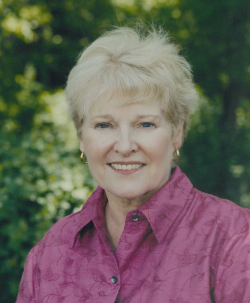 a chance to have a conversation about the angels…well it doesn’t get much better! Joan is the author of a dozen or more books (many bestsellers!), and her work making known the angelic relam are always a delight. Â It was difficult to choose which one to discuss first, but we gave it go. Â I’ve never been disappointed in her writing, and I highly recommended any of the titles found in this post (and yes, I’ve read them all…over and over again).
a chance to have a conversation about the angels…well it doesn’t get much better! Joan is the author of a dozen or more books (many bestsellers!), and her work making known the angelic relam are always a delight. Â It was difficult to choose which one to discuss first, but we gave it go. Â I’ve never been disappointed in her writing, and I highly recommended any of the titles found in this post (and yes, I’ve read them all…over and over again).
[powerpress]
Tags: angels, joan wester anderson, work
This entry was posted on Thursday, April 25th, 2013 at 1:54 pm
You can follow any responses to this entry through the RSS 2.0 feed.
 Dr. Anthony Lilles offers us a tremendous reflection based on a particular passage found in St. Faustina’s diary, #1373.  He shares what it meant when she wrote it in the context of the world in 1937, and what it now means in the  world in 2013.  But more than that, he helps us to see how we can live this out in our everyday lives.
Dr. Anthony Lilles offers us a tremendous reflection based on a particular passage found in St. Faustina’s diary, #1373.  He shares what it meant when she wrote it in the context of the world in 1937, and what it now means in the  world in 2013.  But more than that, he helps us to see how we can live this out in our everyday lives.
[powerpress]
From the Diary of St. Faustina:
1373 O humdrum days, filled with darkness, I look upon you with a solemn and festive eye.Â
This is the scene Dr. Lilles refers to in is talk.
1377 November 5. This morning, five unemployed men came to the gate and insisted on being let in. When Sister N. had argued with them for quite a while and could not make them go away, she then came to the chapel to find Mother [Irene], who told me to go. When I was still a good way from the gate I could hear them banging loudly. At first, I was overcome with doubt and fear, and I did not know whether to open the gate or, like Sister N., to answer them through the little window. But suddenly I heard a voice in my soul saying, Go and open the gate and talk to them as sweetly as you talk to Me. Â Â I opened the gate at once and approached the most menacing of them and began to speak to them with such sweetness and calm that they did not know what to do with themselves. And they too began to speak gently and said, “Well, it’s too bad that the convent can’t give us work.” And they went away peacefully. I felt clearly that Jesus, whom I had received in Holy Communion just an hour before, had worked in their hearts through me. Oh, how good it is to act under God’s inspiration!
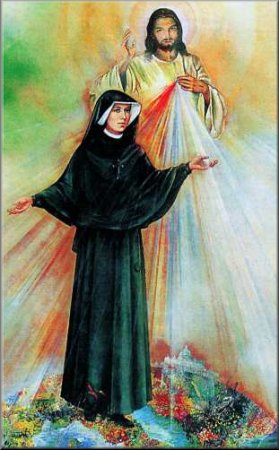 The opening prayer from St. Faustina’s diary #1411 offered by Dr. Lilles:
The opening prayer from St. Faustina’s diary #1411 offered by Dr. Lilles:
O Divine Spirit, Spirit of truth and of light,
Dwell ever in my soul by Your divine grace.
May Your breath dissipate the darkness,
And in this light may good deeds be multiplied.
O Divine Spirit, Spirit of love and of mercy,
Who pour the balm of trust into my heart,
Your grace confirms my soul in good,
Giving it the invincible power of constancy.
O Divine Spirit, Spirit of peace and of joy,
You invigorate my thirsting heart
And pour into it the living fountain of God’s love,
Making it intrepid for battle.
O Divine Spirit, my soul’s most welcome guest,
For my part, I want to remain faithful to You;
Both in days of joy and in the agony of suffering,
I want always, O Spirit of God, to live in Your presence.
O Divine Spirit, who pervade my whole being
And give me to know Your Divine Threefold Life,
Initiating me into Your Divine Essence,
Thus united to You, I will live a life without end.
Tags: Anthony Lilles, darkness, joy, reflection
This entry was posted on Wednesday, April 10th, 2013 at 3:53 pm
You can follow any responses to this entry through the RSS 2.0 feed.
“Walk Humbly Before Your God: Â Simple Steps to a Virtuous Life” is an all-time favorite. Â Fr. Andrew Apostoli,
member of the Franciscan Friars of the 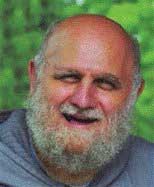 Renewal and a frequent host on the Eternal Word Television Network, has a beautiful way of shining new light on basic truths.  He graciously takes time to teach us on the nature of prayer,  how it develops in our lives and how we can nurture it.  He speaks on Jesus and several aspects surrounding His prayer: praise, thanksgiving, intercession, and how it aids in our suffering.  Our traditional vocal prayers, as well as the depths of contemplation are also discussed including how do we deal with distractions, .  Fr. Apostoli, a humble holy priest, is a master spiritual catechist!  Contained in this 50 minute discussion, you’ll find guidance that can last a lifetime.
Renewal and a frequent host on the Eternal Word Television Network, has a beautiful way of shining new light on basic truths.  He graciously takes time to teach us on the nature of prayer,  how it develops in our lives and how we can nurture it.  He speaks on Jesus and several aspects surrounding His prayer: praise, thanksgiving, intercession, and how it aids in our suffering.  Our traditional vocal prayers, as well as the depths of contemplation are also discussed including how do we deal with distractions, .  Fr. Apostoli, a humble holy priest, is a master spiritual catechist!  Contained in this 50 minute discussion, you’ll find guidance that can last a lifetime.
[powerpress]
You can find Fr. Apostoli’s book here
From the book description:
Christians, if they are to have any impact in today s world, have something of the same code: we fight the good fight, side by side, ready to lay down our lives for one another. Such heroism doesn t come naturally. As Walk Humbly With Your God points out, it is in the day-to-day training, in taking the simple steps to holiness, that heroism becomes second nature.
Fr. Apostoli provides an inspirational guide to conquering our faults, growing in prayer and acquiring the virtues that enable us to walk with God and live for others.
This entry was posted on Monday, March 18th, 2013 at 7:52 am
You can follow any responses to this entry through the RSS 2.0 feed.
FG#1 – Interior Freedom episode 1 – Fountains of Grace: reflections on contemporary spiritual classics with Donna Garrett
Join host Donna Garrett, with Fr. Daniel Brandenburg, LC, as they discuss the spiritual classic “Interior Freedom” by Fr.  Jacques Philippe  a priest of  Communaute des Beatitudes, an international association of the faithful of Pontifical Right founded in France in 1973.  The members of the Community, which has a contemplative vocation based on Carmelite spirituality, are actively engaged in the service of the poor and the proclamation of the Gospel.
[powerpress]
Discussed in this episode, among other topics, Â from “Interior Freedom” page 12
“Human beings were not created for slavery but to be the lords of creation. This is explicitly stated in the Book of Genesis. We were not created to lead drab, narrow, or constricted lives, but to live in the wide-open spaces. We find confinement unbearable simply because we were created in the image of God, and we have within un an unquenchable need for the absolute and the infinitive. That is our greatness and sometimes our misfortune.
We have this great thirst for freedom because our most fundamental aspiration is for happiness; and we sense that there is no happiness without love, and no love without freedom. This is perfectly true. Human beings were created for love, and they can only find happiness in loving and being loved.â€
For other episodes in the this series click here “Fountains of Grace w/Donna Garrett”

You can find “Interior Freedom” here
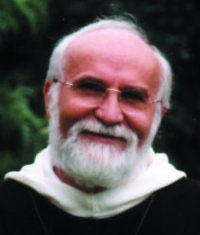
Fr. Jacques Philippe
Tags: Daniel Brandenburg, Donna Garrett, Interior Freedom, LC, reflections
This entry was posted on Wednesday, February 27th, 2013 at 7:58 pm
You can follow any responses to this entry through the RSS 2.0 feed.
Msgr. Esseff offers insights on the Transfiguration of Jesus and it’s meaning for our lives today.
From the NAB Gospel  LK 9:28B-36
and went up the mountain to pray.
While he was praying his face changed in appearance
and his clothing became dazzling white.
And behold, two men were conversing with him, Moses and Elijah,
who appeared in glory and spoke of his exodus
that he was going to accomplish in Jerusalem.
Peter and his companions had been overcome by sleep,
but becoming fully awake,
they saw his glory and the two men standing with him.
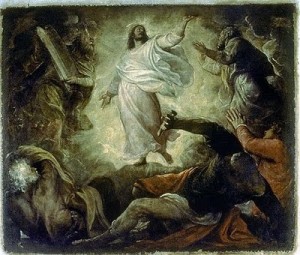 As they were about to part from him,
As they were about to part from him,Peter said to Jesus,
“Master, it is good that we are here;
let us make three tents,
one for you, one for Moses, and one for Elijah.â€
But he did not know what he was saying.
While he was still speaking,
a cloud came and cast a shadow over them,
and they became frightened when they entered the cloud.
Then from the cloud came a voice that said,
“This is my chosen Son; listen to him.â€
After the voice had spoken, Jesus was found alone.
They fell silent and did not at that time
tell anyone what they had seen.
Msgr. John A. Esseff is a Roman Catholic priest in the Diocese of Scranton. He was ordained on May 30th 1953, by the late Bishop William J. Hafey, D.D. at St. Peter’s Cathedral in Scranton, PA. Msgr. Esseff served a retreat director and confessor to Blessed Mother Teresa.   He continues to offer direction and retreats for the sisters of the missionaries of charity around the world. Msgr. Esseff encountered St.  Padre Pio,  who would become a spiritual father to him. He has lived in areas around the world,  serving  in the Pontifical missions, a Catholic organization established by Bl. Pope John Paul II to bring the Good News to the world especially to the poor. Msgr. Esseff assisted the founders of the Institute for Priestly Formation and continues to serve as a spiritual director for the Institute. He continues to  serve as a retreat leader and director to bishops, priests and sisters and seminarians and other religious leaders around the world.  Â
To obtain a copy of Msgr. Esseff’s book by visiting here
Be sure to visit Msgr. Esseff’s website “Building a Kingdom of  Love”
Tags: Jesus, John Esseff, PA, retreat
This entry was posted on Sunday, February 24th, 2013 at 9:10 pm
You can follow any responses to this entry through the RSS 2.0 feed.
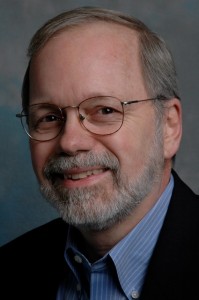 It’s all about conversion…continually turning towards the Lord and allowing Him to heal us. Deliverance ministry really acknowledges the power of Jesus Christ to make all things new and to heal the damage done to us by sin and those spirits which get into our brokeness and wounds to drive us away from God. Neil Lozano has done extraordinary work with the “Unbound Ministries” ; it truly allow us to let the Father “deliver us from evil”. This is one of the best books I have ever read on the subject. Absolutely a must for everyone on the spiritual journey!!! “Be not afraid”, an
It’s all about conversion…continually turning towards the Lord and allowing Him to heal us. Deliverance ministry really acknowledges the power of Jesus Christ to make all things new and to heal the damage done to us by sin and those spirits which get into our brokeness and wounds to drive us away from God. Neil Lozano has done extraordinary work with the “Unbound Ministries” ; it truly allow us to let the Father “deliver us from evil”. This is one of the best books I have ever read on the subject. Absolutely a must for everyone on the spiritual journey!!! “Be not afraid”, an d really “all you need is love”.
d really “all you need is love”.
find Neil’s work at www.heartofthefather.com
[powerpress]
From the book description:
Do you feel chained to a particular sin pattern that you cannot break?
Do you still feel guilty, ashamed, and doomed to repeat a besetting sin even after receiving the sacrament of Reconciliation?
Then you may find a way to spiritual freedom through deliverance prayer.
In Resisting the Devil, author Neal Lozano shows that sometimes evil spirits tell us lies that lock us into sins and personal problems. He explains the practice of deliverance, a way of dealing with such demonic influences that is supported by the teaching and traditionof the Catholic Church.
–Learn how to recognize the activity of evil spirits
–See how deliverance from spiritual bondage can be gentle, safe, and effective –Understand how deliverance differs from exorcism and how deliverance and Reconciliation can work together–Read the testimonies of women and men who have been freed through deliverance ministry.
This entry was posted on Sunday, February 17th, 2013 at 12:45 am
You can follow any responses to this entry through the RSS 2.0 feed.
Episode 11 “What am I to do?†The Discernment of God’s Will in Everyday Decisions w/Fr. Timothy 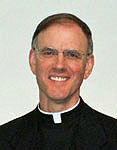 Gallagher.
Gallagher.
In this episode with Fr. Gallagher,  there is a brief summary of the First and Second Mode.  Then Fr. Gallagher breaks open the Third Mode, a Ponderousness of Reasons, also know as the 4 columns.
For other episodes in the series visit The Discerning Hearts “Discerning the Will of God†page
Father Timothy M. Gallagher, O.M.V., was ordained in 1979 as a member of the Oblates of the Virgin Mary, a religious community dedicated to retreats and spiritual formation according to the Spiritual Exercises of St. Ignatius. Â Fr. Gallagher is featured on the EWTN series “Living the Discerning Life: Â The Spiritual Teachings of St. Ignatius of Loyola”.
For more information on how to obtain copies of Fr. Gallaghers’s various books and audio which are available for purchase, please visit  his  website:   frtimothygallagher.org
For the other episodes in this series check out Fr. Timothy Gallagher’s “Discerning Hearts†page
Tags: catholic, catholic podcast, catholic prayer, cathollc spirituality, Father Timothy M. Gallagher, Gallagher, Timothy Gallagher
This entry was posted on Thursday, February 14th, 2013 at 3:13 pm
You can follow any responses to this entry through the RSS 2.0 feed.
Special 4 – Ash Wednesday and Lent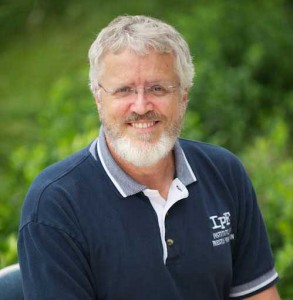
[powerpress]
From the archives of Spirit Mornings we bring you Deacon James Keating discussing Ash Wednesday and our Lenten practice. Deacon Keating is the Director of Theological Formation for the Institute for Priestly Formation at Creighton University.
 Click here for more Deacon Keating
Click here for more Deacon Keating
Tags: almsgiving, ash wednesday, creighton university, Deacon James Keating, Deacon Keating, fasting, institute for priestly formation, james keating, lent, prayer, theological formation
This entry was posted on Wednesday, February 13th, 2013 at 12:58 am
You can follow any responses to this entry through the RSS 2.0 feed.
Episode 17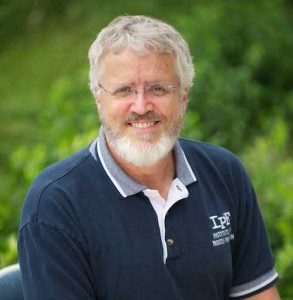 -The Way of Mystery: The Eucharist and Moral Living– Mystical experiences and consoling prayer. Prayer is earnestly desired, and prayer because something we delight in. Also the prayer that will spontaneously occur. Another type of experience is the aspect of the sacramental encounter.
-The Way of Mystery: The Eucharist and Moral Living– Mystical experiences and consoling prayer. Prayer is earnestly desired, and prayer because something we delight in. Also the prayer that will spontaneously occur. Another type of experience is the aspect of the sacramental encounter.
[powerpress]
Deacon James Keating, PhD, the director of Theological Formation for the Institute for Priestly Formation, located at Creighton University, in Omaha, is making available to â€Discerning Hearts†and all who listen, his series of programs entitled “The Way of Mysteryâ€.
 The Vatican II documents remind us that the spiritual journey is not made in a vacuum, that God has chosen to save us, not individually, but as The People of God. The Eucharist must help Christians to make their choices by discerning out of Christ’s paschal mystery. For this process to take place, however, Christians must first understand how the Eucharist puts them in touch with Christ’s passion, death, and resurrection, and what concrete implications being in touch with this mystery has for their daily lives.
The Vatican II documents remind us that the spiritual journey is not made in a vacuum, that God has chosen to save us, not individually, but as The People of God. The Eucharist must help Christians to make their choices by discerning out of Christ’s paschal mystery. For this process to take place, however, Christians must first understand how the Eucharist puts them in touch with Christ’s passion, death, and resurrection, and what concrete implications being in touch with this mystery has for their daily lives.
For more information on the “Institute of Priestly Formation†and for other material available by Deacon Keating, just click here
Don’t forget to pickup a copy of “Communion with Christ†, it is one of the best audio sets on prayer…ever!
Check out Deacon Keating’s “Discerning Heart†page
Tags: choices, creighton university, Deacon James Keating, prayer
This entry was posted on Tuesday, February 5th, 2013 at 6:47 am
You can follow any responses to this entry through the RSS 2.0 feed.
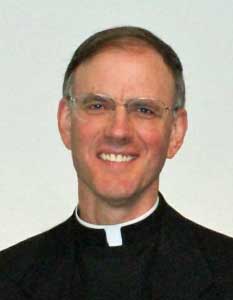 Episode 10 “What am I to do?†The Discernment of God’s Will in Everyday Decisions w/Fr. Timothy Gallagher.
Episode 10 “What am I to do?†The Discernment of God’s Will in Everyday Decisions w/Fr. Timothy Gallagher.
In this episode with Fr. Gallagher,  we can continue our conservation on  “The Second Mode” of discernment.  In particular, we discuss the role of the spiritual director.  We then begin discussing “The Third Mode”.
For other episodes in the series visit The Discerning Hearts “Discerning the Will of God†page
Father Timothy M. Gallagher, O.M.V., was ordained in 1979 as a member of the Oblates of the Virgin Mary, a religious community dedicated to retreats and spiritual formation according to the Spiritual Exercises of St. Ignatius. Â Fr. Gallagher is featured on the EWTN series “Living the Discerning Life: Â The Spiritual Teachings of St. Ignatius of Loyola”.
For more information on how to obtain copies of Fr. Gallaghers’s various books and audio which are available for purchase, please visit  his  website:   frtimothygallagher.org
For the other episodes in this series check out Fr. Timothy Gallagher’s “Discerning Hearts†page
Tags: Father Timothy M. Gallagher, Gallagher, Timothy Gallagher
This entry was posted on Monday, February 4th, 2013 at 1:54 pm
You can follow any responses to this entry through the RSS 2.0 feed.
This extraordinary Eucharistic hymn, by the great St. Thomas Aquinas, is a fan favourite among the faithful. This version regretably leaves out the second verse. The recording is from the CD illuminations, compiled by Dan Gibson. the Latin text and English translation follow:
| Latin text | An English translation | |
|---|---|---|
|
|
Tags: Dan Gibson, faith, last supper, st thomas aquinas, thomas aquinas
This entry was posted on Monday, January 28th, 2013 at 9:54 am
You can follow any responses to this entry through the RSS 2.0 feed.
On Holy Mother Mary
On Holy Repentance
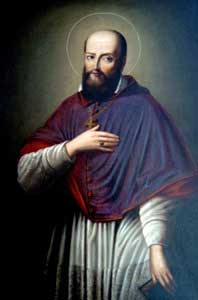 CHAPTER III. Devotion is suitable to every Vocation and Profession.
CHAPTER III. Devotion is suitable to every Vocation and Profession.
WHEN God created the world He commanded each tree to bear fruit after its kind; 88 Gen. i. 12. and even so He bids Christians,—the living trees of His Church,—to bring forth fruits of devotion, each one according to his kind and vocation.
A different exercise of devotion is required of each—the noble, the artisan, the 9 servant, the prince, the maiden and the wife; and furthermore such practice must be modified according to the strength, the calling, and the duties of each individual.
I ask you, my child, would it be fitting that a Bishop should seek to lead the solitary life of a Carthusian? And if the father of a family were as regardless in making provision for the future as a Capucin, if the artisan spent the day in church like a Religious, if the Religious involved himself in all manner of business on his neighbour’s behalf as a Bishop is called upon to do, would not such a devotion be ridiculous, ill-regulated, and intolerable? Nevertheless such a mistake is often made, and the world, which cannot or will not discriminate between real devotion and the indiscretion of those who fancy themselves devout, grumbles and finds fault with devotion, which is really nowise concerned in these errors.
No indeed, my child, the devotion which is true hinders nothing, but on the contrary it perfects everything; and that which runs counter to the rightful vocation of any one is, you may be sure, a spurious devotion.
Aristotle says that the bee sucks honey from flowers without damaging them, leaving them as whole and fresh as it found them;—but true devotion does better still, for it not only hinders no manner of vocation or duty, but, contrariwise, it adorns and beautifies all.
Throw precious 10 stones into honey, and each will grow more brilliant according to its several colour:—and in like manner everybody fulfils his special calling better when subject to the influence of devotion:—family duties are lighter, married love truer, service to our King more faithful, every kind of occupation more acceptable and better performed where that is the guide.
It is an error, nay more, a very heresy, to seek to banish the devout life from the soldier’s guardroom, the mechanic’s workshop, the prince’s court, or the domestic hearth. Of course a purely contemplative devotion, such as is specially proper to the religious and monastic life, cannot be practised in these outer vocations, but there are various other kinds of devotion well-suited to lead those whose calling is secular, along the paths of perfection. The Old Testament furnishes us examples in Abraham, Isaac and Jacob, David, Job, Tobias, Sarah, Rebecca and Judith; and in the New Testament we read of St. Joseph, Lydia and Crispus, who led a perfectly devout life in their trades:—we have S. Anne, Martha, S. Monica, Aquila and Priscilla, as examples of household devotion, Cornelius, S. Sebastian, and S. Maurice among soldiers;—Constantine, S. Helena, S. Louis, the Blessed Amadaeus, 99 It is probable that S. Francis here means to indicate Amadeo IX., Duke of Savoy, who died 1472. and 11 S. Edward on the throne. And we even find instances of some who fell away in solitude,—usually so helpful to perfection,—some who had led a higher life in the world, which seems so antagonistic to it. S. Gregory dwells on how Lot, who had kept himself pure in the city, fell in his mountain solitude. Be sure that wheresoever our lot is cast we may and must aim at the perfect life.
Check out other Discerning Hearts Posts on St. Francis de Sales
[p2p type=”id” value=”2281″]
[p2p type=”id” value=”2622″]
Meditations from the Introduction to the Devout Life by St. Francis de Sales
Tags: chapter xix, devotion, family, heresy, holy mother mary, introduction to the devout life, love, repentance, st francis de sales
This entry was posted on Thursday, January 24th, 2013 at 12:07 am
You can follow any responses to this entry through the RSS 2.0 feed.
 Episode 8 “What am I to do?†The Discernment of God’s Will in Everyday Decisions w/Fr. Timothy Gallagher.
Episode 8 “What am I to do?†The Discernment of God’s Will in Everyday Decisions w/Fr. Timothy Gallagher.
In this episode, Fr. Gallagher discusses the Three Modes, and in particular the we discuss “The Second Mode”: Â The Attraction of the Heart. Â When clarity is recieved through the discernment of spirits of either spiritual consolation or desolation.
For other episodes in the series visit The Discerning Hearts “Discerning the Will of God†page
Father Timothy M. Gallagher, O.M.V., was ordained in 1979 as a member of the Oblates of the Virgin Mary, a religious community dedicated to retreats and spiritual formation according to the Spiritual Exercises of St. Ignatius. Â Fr. Gallagher is featured on the EWTN series “Living the Discerning Life: Â The Spiritual Teachings of St. Ignatius of Loyola”.
For more information on how to obtain copies of Fr. Gallaghers’s various books and audio which are available for purchase, please visit  his  website:   frtimothygallagher.org
For the other episodes in this series check out Fr. Timothy Gallagher’s “Discerning Hearts†page
Tags: Father Timothy M. Gallagher, Gallagher, Timothy Gallagher
This entry was posted on Monday, January 21st, 2013 at 6:30 am
You can follow any responses to this entry through the RSS 2.0 feed.
Episode 15 -The Way of Mystery: The Eucharist and Moral Living– The journey begins into the unitive way…the beginning of falling in love with God. Combined with the entry into the sacramental life, the living out the moral life becomes more than meeting a “goal”, but becomes a “way” of life.

[powerpress]
Deacon James Keating, PhD, the director of Theological Formation for the Institute for Priestly Formation, located at Creighton University, in Omaha, is making available to â€Discerning Hearts†and all who listen, his series of programs entitled “The Way of Mysteryâ€.
 The Vatican II documents remind us that the spiritual journey is not made in a vacuum, that God has chosen to save us, not individually, but as The People of God. The Eucharist must help Christians to make their choices by discerning out of Christ’s paschal mystery. For this process to take place, however, Christians must first understand how the Eucharist puts them in touch with Christ’s passion, death, and resurrection, and what concrete implications being in touch with this mystery has for their daily lives.
The Vatican II documents remind us that the spiritual journey is not made in a vacuum, that God has chosen to save us, not individually, but as The People of God. The Eucharist must help Christians to make their choices by discerning out of Christ’s paschal mystery. For this process to take place, however, Christians must first understand how the Eucharist puts them in touch with Christ’s passion, death, and resurrection, and what concrete implications being in touch with this mystery has for their daily lives.
For more information on the “Institute of Priestly Formation†and for other material available by Deacon Keating, just click here
Don’t forget to pickup a copy of “Communion with Christ†, it is one of the best audio sets on prayer…ever!
Check out Deacon Keating’s “Discerning Heart†page
Tags: choices, creighton university, Deacon James Keating, eucharist, sacramental life, the unitive way, unitive way
This entry was posted on Monday, January 21st, 2013 at 6:12 am
You can follow any responses to this entry through the RSS 2.0 feed.

